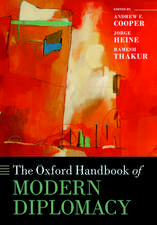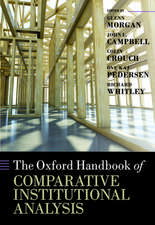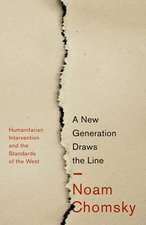Institutional Supports for the International Rule of Law: Challenges of Globalisation
Editat de Charles Sampford, Ramesh Thakuren Limba Engleză Hardback – 30 iul 2014
This book explores the institutions that support the effectiveness of the rule of law domestically. It focuses on the extent to which similar institutions already exist at international level and analyses the possibility of their further development. The authors speculate on how the international rule of law might be advanced in the future, thereby suggesting potential strategies for strengthening the international rule of law. Adopting an interdisciplinary approach and combining the fields of international relations, politics and law, this book covers a range institutions including:
- UN Security Council
- International Court of Justice
- Human rights machinery
- Regional human rights
- International Criminal Court
- World Trade Organization
- International Tribunal for the Law of the Sea
- UN Department of Peacekeeping Operations.
| Toate formatele și edițiile | Preț | Express |
|---|---|---|
| Paperback (1) | 299.52 lei 6-8 săpt. | |
| Taylor & Francis – 4 aug 2016 | 299.52 lei 6-8 săpt. | |
| Hardback (1) | 819.09 lei 6-8 săpt. | |
| Taylor & Francis – 30 iul 2014 | 819.09 lei 6-8 săpt. |
Preț: 819.09 lei
Preț vechi: 1140.00 lei
-28% Nou
Puncte Express: 1229
Preț estimativ în valută:
156.73€ • 170.78$ • 132.07£
156.73€ • 170.78$ • 132.07£
Carte tipărită la comandă
Livrare economică 23 aprilie-07 mai
Preluare comenzi: 021 569.72.76
Specificații
ISBN-13: 9780415857369
ISBN-10: 0415857368
Pagini: 194
Dimensiuni: 156 x 234 x 15 mm
Greutate: 0.41 kg
Ediția:New.
Editura: Taylor & Francis
Colecția Routledge
Seria Challenges of Globalisation
Locul publicării:Oxford, United Kingdom
ISBN-10: 0415857368
Pagini: 194
Dimensiuni: 156 x 234 x 15 mm
Greutate: 0.41 kg
Ediția:New.
Editura: Taylor & Francis
Colecția Routledge
Seria Challenges of Globalisation
Locul publicării:Oxford, United Kingdom
Public țintă
Postgraduate and UndergraduateCuprins
1. Introduction Charles Sampford and Ramesh Thakur Part 1 2. International Criminal Justice: At the vortex of power, norms and a sifting global order Ramesh Thakur 3. Norms as Frames for Institutions: The Pact of Paris, Nuremberg, and the International Rule of Law William Maley 4. Rethinking international Rule of Law: International Rule of Law as International Legitimacy Jean-Marc Coicaud Part 2 5. Special Rapporteurs and the Development of the International Rule of Law Michael Kirby 6. International Criminal Court in the Development of International Rule of Law: A reflection of Asian/African views Rahmat Mohamad 7. The Building of the International Rule of Law through the Work of the International Criminal Courts Vesselin Popovski 8. National Militaries and the Development of the International Rule of Law John Sanderson 9. The Prospects for UN Security Council Reform: Implications for the international rule of law Sam Daws Part 3 10. Disputes over Exemplary Justice: The situation in the Republic of Kenya before the International Criminal Court Edwin Bikundo 11. No Longer a Moot Point: International NGO Tribunals Charles Sampford 12. Refugee Machinery and the Development of the International Rule of Law Angus Francis
Notă biografică
Charles Sampford is the Director of the Institute for Ethics, Governance and Law,Griffith University, Australia, a joint initiative with the United Nations University, Griffith, QUT, ANU, Jindal Global University and the Center for Asian Integrity in Manila.
Ramesh Thakur is the Director of the Centre for Nuclear Non-proliferation and Disarmament (CNND) in the Crawford School, Australian National University.
Ramesh Thakur is the Director of the Centre for Nuclear Non-proliferation and Disarmament (CNND) in the Crawford School, Australian National University.
Descriere
This book explores the institutions that support the effectiveness of the rule of law domestically. It focuses on the extent to which similar institutions already exist at international level and analyses the possibility of their further development. The authors speculate on how the international rule of law might be advanced in the future, thereby suggesting potential strategies for strengthening the international rule of law. Adopting an interdisciplinary approach and combining the fields of international relations, politics and law, this book covers a range institutions including:
- UN Security Council
- International Court of Justice
- Human Rights machinery
- Regional Human Rights
- International Criminal Court
- World Trade Organization
- International Tribunal for the Law of the Sea
- UN Department of Peacekeeping Operations.






























